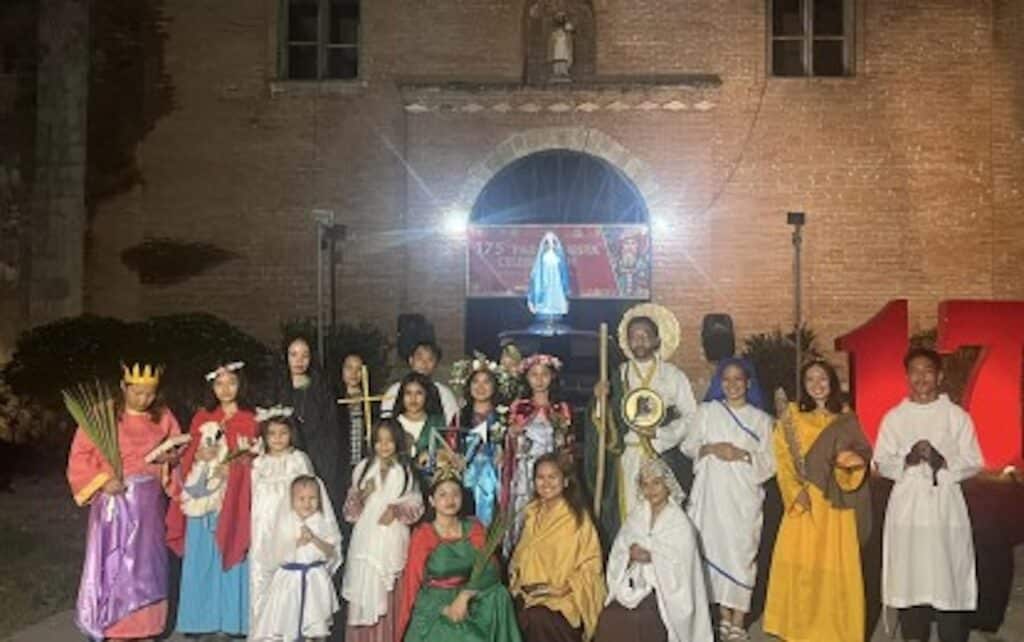Kalag-Kalag: Catholics urged to celebrate lives of saints, departed

HALLOWEEN CELEBRATION. Catholic parishioners dress up like their favorite saints during a Parade of Saints in Bacong, Negros Oriental on Thursday (Oct. 31, 2024). Halloween is celebrated in many countries to honor the saints and the departed on Nov. 1 and Nov. 2. (Photo courtesy of Msgr. Glenn Corsiga Facebook page)
DUMAGUETE CITY—A Catholic priest urged the faithful to study and understand the real meaning of Halloween and celebrate the lives of saints and the departed in a manner that glorifies God instead of participating in practices that lean toward paganism.
“On All Saints’ Day we celebrate holiness, the sanctity of life, the goodness of God through the saints and we glorify Him, but on the other side, the devil wants to invert the celebration and many people honor darkness, horror, and scary things, knowingly or unknowingly,” Fr. Ronnie Ablong, an exorcist of the Diocese of Dumaguete, said on Friday.
READ MORE:
Kalag-Kalag 2024: Live updates
Occult practices during Undas invite the devil, says lead PH exorcist
Ablong discouraged putting up horror booths and chambers that exhibit spooky or gruesome objects and engaging in customary practices and rituals that reflect the dark side.
The priest said he is happy to see that many people on social media are now slowly diverting to activities that reflect the lives of saints, such as the Parade of Saints, where participants are dressed in costumes of their favorite holy persons.
Tradition through generations
The altar of Estrella Ramos, 68, is all set and ready for her yearly celebration of “Kalag-kalag”, a Cebuano term for the religious feasts, All Saints’ and All Souls’ Days, to remember and honor the dearly departed family members and friends.
The table is not the year-round permanent family altar where a Crucifix and images of the Blessed Virgin Mary and some saints are set for regular prayers and worship, Ramos said, but rather one that is dedicated to the dead.
“I prepare the altar usually on Nov. 1 or All Saints’ Day, even though All Souls’ Day is on Nov. 2, as it is a practice handed down to us from previous generations, to celebrate and remember the lives of our loved ones,” she said in Cebuano.
The altar is decorated with candles, flowers, pictures of the deceased family members, and an offering of food and drinks that were their “favorites”, she added.
“Kalag-kalag” is a deeply-rooted Filipino tradition, gleaned from the Cebuano word “kalag” (ghost or spirit), that older beliefs thought of as a time when the spirits of the dead come to visit the living, Ramos recalls being taught this by her late great grandmother.
She said she sees nothing wrong in believing that the ghosts of relatives would come by for a visit, and it would be a sign that “they are still present among us”.
Rosemary Paculanang, a mother of three, also recalls growing up seeing her grandmother preparing a meal and placing it on an altar, reciting “incantations” as if to welcome the ghosts of departed loved ones.
“I never really understood it at the time but I’ve come to realize that it is wrong to communicate with the dead because we were taught at school that they have already left this earthly existence,” she went on in the Cebuano dialect.
She said her children are raised to honor and glorify God in their deeds and acts of kindness and charity and what is more important than “this superficial celebration is to offer prayers and masses for the departed that they may one day be in heaven”.
Overcoming demonic distractions
Fr. Ablong encouraged the faithful to be wary of deceitful practices that would make them vulnerable to demonic influence or even diabolic possession.
“Halloween parties with macabre themes and horror booths are a diversion of our desire to become holy and to praise God by living a holy life,” he pointed out.
Ablong lamented that many churchgoers are also into the wrong ways of celebrating Halloween and they are aware of it.
It is not wrong to celebrate Halloween but this should be done through prayer, offering masses, bringing flowers, and offering candles to the graves of the departed, and imitating the lives of saints, especially their virtues, as it is “our goal in life to become holy”, he said. (PNA)
Disclaimer: The comments uploaded on this site do not necessarily represent or reflect the views of management and owner of Cebudailynews. We reserve the right to exclude comments that we deem to be inconsistent with our editorial standards.
